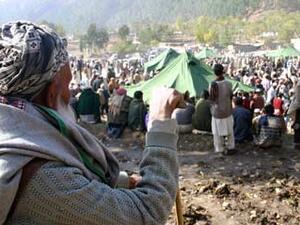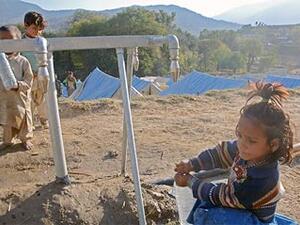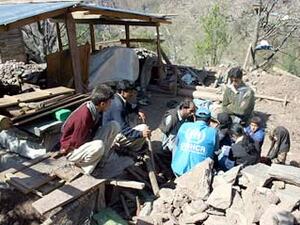South Asia earthquake - latest developments
South Asia earthquake - latest developments
The window to reach earthquake survivors in the remote mountains and high valleys of quake-hit Pakistan is fast closing with the onset of cold weather. With more than 1,000 tonnes of relief supplies now on the ground and more on the way from around the world, UNHCR is working with the Pakistan military, the UN Joint Logistics Cell (UNJLC) and other partners to get these materials distributed quickly. This is still a life-saving operation and every minute counts. For example, we are providing 100,000 blankets, 2,000 large family tents, 10,000 plastic sheets, 5,000 jerry cans and 200 burial cloths to the Pakistan military and Joint Logistics Cell for immediate airlift to inaccessible areas.
Also, UNHCR's emergency teams in Mansehra, Bagh, Muzaffarabad, Balakot and Batagram and working with the army and others to identify sites for more temporary camps for the displaced at lower elevations. So far, a dozen sites have been established and conditions are slowly improving in them. Sanitation and waste disposal remain problems, however. On Thursday, our Bagh emergency team and local authorities identified three new sites near the town for 500 families. An estimated 15,000 people in surrounding villages are in need of urgent assistance.
In addition to officially established camps, spontaneous settlements are sprouting up everywhere in the region and UNHCR continues to distribute relief items to those in immediate need.
In addition to UNHCR's existing 320 staff members in Pakistan, we have sent 14 emergency specialists and another nine are on the way. Our logistics hub has been established in Mansehra, along with a fleet of trucks.
Meanwhile, the NATO-UNHCR airlift from Incirlik, Turkey, is now in its 10th day and has so far delivered more than 450 tonnes of urgently needed tents, blankets and other relief items from our emergency stockpiles to Pakistan. As of last night, a total of 34 sorties had been flown by cargo planes from Turkey, France, Denmark, the United Kingdom, the United States and Italy. The unprecedented joint airlift began on Oct. 19 and we expect to deliver a total 860 tonnes from our stocks in Turkey. Separately, UNHCR has also delivered at least 14 planeloads of supplies from its emergency stockpiles in Denmark, Dubai and Jordan, and sent convoys from its warehouses in neighbouring Afghanistan.
On Wednesday, we also set up a new relief supply line from Iran with the departure of a convoy from our Kemanshah warehouse, near the border with Iraq, carrying 62 tonnes of relief items. The cargo includes 10,000 blankets, 3,000 plastic tarpaulins, 3,000 plastic mats, 1,000 mattresses and several tonnes of other non-food items. The convoy will take two to three days to reach the Pakistan border, where the cargo will be transferred onto local trucks for delivery to the earthquake zone - a total journey of about 3,500 km.
We are also planning for a second phase of delivery and distribution in which more than 300,000 blankets, 30,000 mattresses, 15,000 plastic sheets, 1,000 tents and many more relief items will be transported to Pakistan. But we are still in urgent need of funds. So far, UNHCR has received $4.6 million ($2.5 million Sweden; $1 million Japan; $323,415 Italy; $300,000 Czech Republic; $500,000 Turkey) of the $30 million we're seeking. That does not include the in-kind contributions made by the individual NATO countries that are providing planes and other assistance for the airlift.









